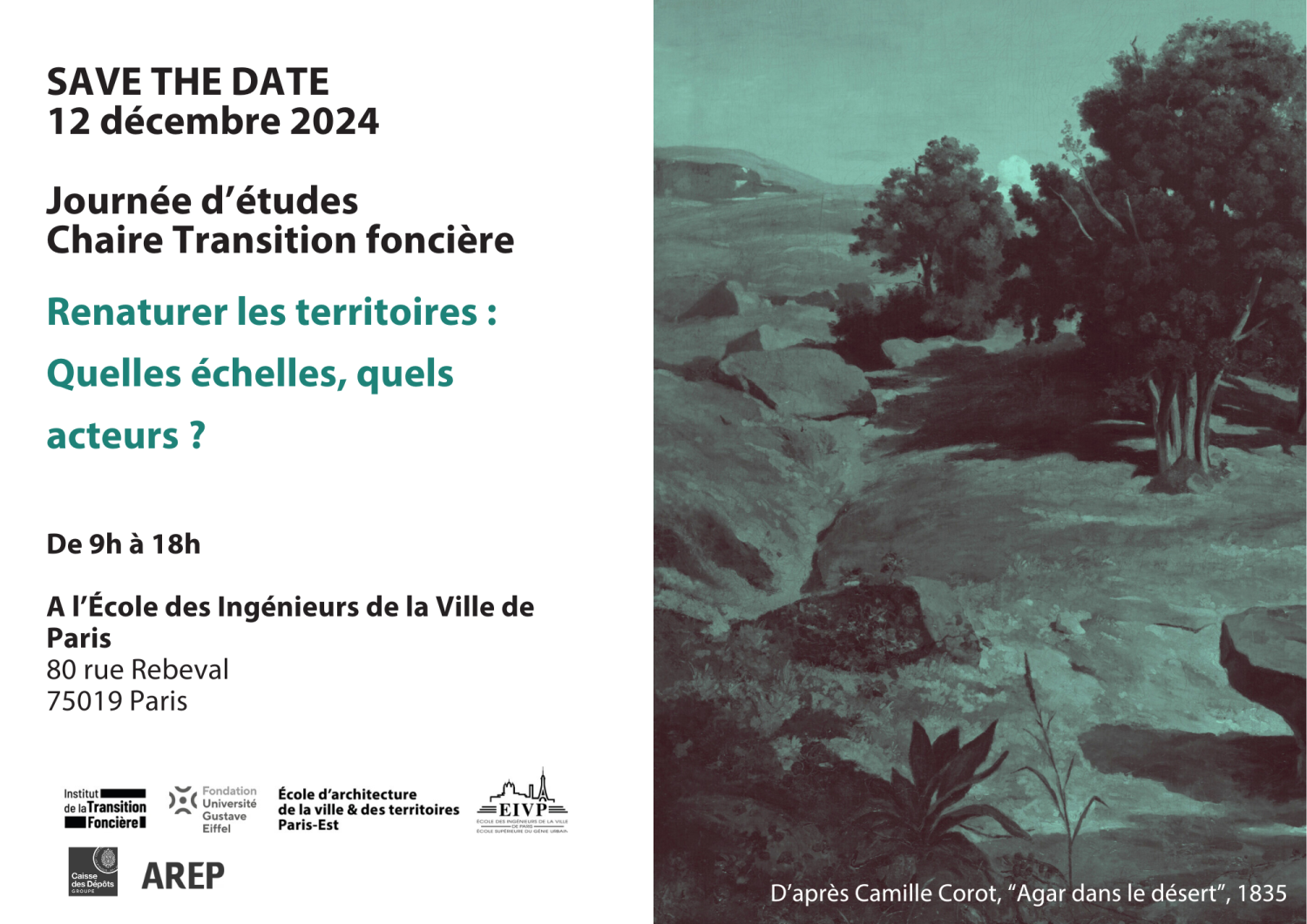Chaire Transition foncière
A partnership research chair initiated by the Gustave Eiffel University Foundation and the Institut de la Transition Foncière, the Land Transition Chair is supported scientifically within the Gustave Eiffel University by two of its component schools, the École d'architecture de la ville & des territoires Paris-Est and the École des Ingénieurs de la Ville de Paris (EIVP).
The Chair
The guiding principles: interdisciplinarity and openness to research audiences.
The aim of the Chair is to decompartmentalize scientific disciplines dealing with soil and land issues. It is conceived as a meeting place, where a variety of perspectives on soils can be brought together, whether from the social sciences or the life sciences, from quantitative land management to the qualitative preservation of living soils.
It was also conceived as a response to the need for a federating project between research and operational players (local authorities, urban operators, prime contractors, etc.) on the subject. The Chair's ambition is to develop scientific approaches that can be transferred to the operational sphere, in particular to ensure that this issue finds its place in territorial public action.
Areas of research
Three main lines of research have been identified to address different issues related to soil functionality, the central focus of the Chair.
- Restoration of the ecological functions of degraded soils
- Changes in economic models for development and real estate
- Soil governance issues, through law and public policy
Other cross-disciplinary research projects may be linked to these different themes, notably around issues of soil representation and mapping.
Structuring of the Chair's activities
The Chair's activities are divided into three main areas of development.
- Animation and structuring of a research ecosystem** for the production of knowledge. This objective is expressed in particular through the organization of an annual study cycle, enabling scientists from different disciplines and laboratories to exchange ideas and build interdisciplinarity.
The 2024 study cycle focuses on restoring the functions of degraded soils. - Support for targeted research projects: theses, post-doctorates and research internships, as well as student work at the Chair's member schools. The Chair's first thesis (Lukas Madl, 2024-2027) will focus on integrating soil knowledge into the practice of "renaturation".
- The construction of structuring projects to serve soils within the Gustave Eiffel University. In the longer term, the Chair aims to raise the profile of soil-related issues and develop knowledge transfer in this field, by designing a demonstrator based on soil, and promoting new soil-related training courses.
Agenda
Coming soon :
Past events :
December 12, 2024: Journée d'études of the Chair at the École des Ingénieurs de la Ville de Paris "Renaturer les territoires: quelles échelles, quels acteurs?"
March 21, 2024: Study Day of the Chair: "Restoring soil functions? Scientific approaches and interdisciplinary perspectives".
November 29, 2023: Launch event for the Land Transition Chair. (link: https://clap.univ-eiffel.fr/permalink/v126885778bc7qc7v34u/iframe/target:_blank text: Watch the video of the event here!
Podcast
Partners
L'Institut de la Transition Foncière : At the origin of the creation of the Chair, the Institut is an association bringing together public and private players in land management, with the aim of placing the preservation of land and living soil at the heart of urban and territorial issues.
The Fondation Université Gustave Eiffel : A partnership foundation of the Université Gustave Eiffel, it supports the Chair alongside the Institut, and aims to support research initiatives in the service of tomorrow's sustainable city.
École d'architecture de la ville & des territoires Paris-Est : The school, a founding member of the Université Gustave Eiffel, provides scientific support for the development of the Chair within the framework of the Observatoire de la Condition Suburbaine, its research laboratory, a member of the UMR AUSser.
Ecole des Ingénieurs de la Ville de Paris : This leading urban engineering school, a founding member of the Université Gustave Eiffel, provides scientific support for the development of the Chair through its Chaires & Prospective department.
CDC Institute for Research : The Institut pour la Recherche is a program designed to support research in the strategic fields of intervention of the Caisse des Dépôts Group. It supports the development of the Chair through its sponsorship activities.
AREP : Subsidiary of SNCF Gares & Connexions, AREP is a major architecture and urban planning agency whose ambition is to build concrete responses to the ecological emergency. AREP has joined the Chair's dynamic by supporting the Institute's first thesis, via a CIFRE agreement.
OCS/AUSser
Lab'URBA
Work and publications
2024-2027: Lukas Madl's thesis on the integration of soil knowledge into renaturation practices (CIFRE AREP - Université Gustave Eiffel)
Can degraded soil be repaired? How can its ecological functionality be improved? What materials are available to rebuild soil? Can we assess the cost of soil restoration? How can urban agriculture gardeners appropriate these techniques?
These questions were on the agenda for the first study day of the Land Transition Chair on March 21, 2024, dedicated to the restoration of soil functions. Ecologists, soil scientists, urban planners, geographers, anthropologists and economists pooled their expertise and fields of study to share the state of scientific research in this field. This publication reports on all the scientific presentations, discussions and debates that took place during the day.
Study day on December 12, 2024
Renaturer les territoires: quelles échelles, quels acteurs?
Registration link
Programme
Study day on March 21, 2024
Restoring soil functions?
Podcast
Cahier n°1
Scientific management
Mathieu Delorme
Youssef Diab
Coordination
Zoé Raimbault
Supporting laboratories
OCS/AUSser
Lab'URBA
Partners
Institut de la transition foncière
Fondation Université Gustave Eiffel
EIVP

